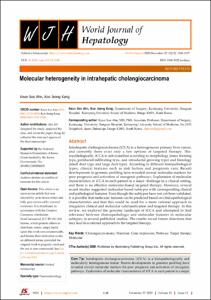Molecular heterogeneity in intrahepatic cholangiocarcinoma
- Keimyung Author(s)
- Ahn, Keun Soo; Kang, Koo Jeong
- Department
- Dept. of Surgery (외과학)
- Journal Title
- World Journal of Hepatology
- Issued Date
- 2020
- Volume
- 12
- Issue
- 12
- Keyword
- Cholangiocarcinoma; Mutation; Gene expression; Pathway; Target therapy; Molecular
- Abstract
- Intrahepatic cholangiocarcinoma (iCCA) is a heterogeneous primary liver cancer, and currently there exist only a few options of targeted therapy. Histopathologically, iCCA is sub-classified according to morphology (mass forming type, periductal infiltrating type, and intraductal growing type) and histology (small duct type and large duct type). According to different histopathological types, clinical features such as risk factors and prognosis vary. Recent developments in genomic profiling have revealed several molecular markers for poor prognosis and activation of oncogenic pathways. Exploration of molecular characteristics of iCCA in each patient is a major challenge in a clinical setting, and there is no effective molecular-based targeted therapy. However, several recent studies suggested molecular-based subtypes with corresponding clinical and pathological features. Even though the subtypes have not yet been validated, it is possible that molecular features can be predicted based on clinicopathological characteristics and that this could be used for a more rational approach to integrative clinical and molecular subclassification and targeted therapy. In this review, we explored the genomic landscape of iCCA and attempted to find relevance between clinicopathologic and molecular features in molecular subtypes in several published studies. The results reveal future directions that may lead to a rational approach to the targeted therapy.
- Publisher
- School of Medicine (의과대학)
- Citation
- Keun Soo Ahn and Koo Jeong Kang. (2020). Molecular heterogeneity in intrahepatic cholangiocarcinoma. World Journal of Hepatology, 12(12), 1148–1157. doi: 10.4254/wjh.v12.i12.1148
- Type
- Article
- ISSN
- 1948-5182
- Source
- https://www.wjgnet.com/1948-5182/full/v12/i12/1148.htm
- Appears in Collections:
- 1. School of Medicine (의과대학) > Dept. of Surgery (외과학)
- 파일 목록
-
-
Download
 oak-2020-0797.pdf
기타 데이터 / 706.91 kB / Adobe PDF
oak-2020-0797.pdf
기타 데이터 / 706.91 kB / Adobe PDF
-
Items in Repository are protected by copyright, with all rights reserved, unless otherwise indicated.